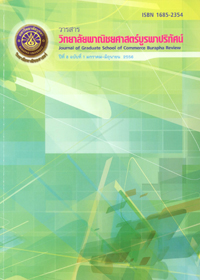ประเด็นสำคัญของการปรับปรุงมาตรฐานการสอบบัญชีไทย (ครั้งใหญ่)
Main Article Content
Abstract
สภาวิชาชีพบัญชีได้ปรับปรุงมาตรฐานการสอบัญชีของไทยตามแนวทางการของ International Accounting Standards Board (IASB) ซึ่งแนวทางการปรับปรุงได้แนวคิดการแสดงมูลค่า (Measurement) ของรายการบัญชีในงบการเงิน ที่จากเดิมกำหนดให้แสดงด้วยราคาทุน (Historical Costs) เป็นราคายุติธรรม (Fair Value) นอกจากจากนั้นหน่วยงาน กำกับดูแลผู้สอบบัญชีในหลายประเทศ เช่น สหรัฐอเมริกา สหราชอาณาจักร เป็นต้น มีความเป็นห่วงคุณภาพ งานการสอบบัญชีของการตรวจสอบงบการเงินรวมของกลุ่มกิจการที่ไม่มีความสม่ำเสมอ หลักฐานเอกสารที่ได้จากการ ประมาณทางการบัญชีและมูลค่ายุติธรรม รวมทั้งการเปิดเผยรายการที่เกี่ยวข้องกัน ด้วยเหตุผลดังกล่าวจึงนำไปสู่การ ปรับเปลี่ยนมาตรฐานการสอบบัญชีที่สำคัญ โดยเนื้อหามีความแตกต่างที่สำคัญของแนวทางการสอบบัญชีที่นำมาใช้ก่อน 1 มกราคม 2555 สามารถสรุปได้ดังนี้ จรรยาบรรณของผู้ประกอบวิชาชีพบัญชีและการควบคุมภาพงานสอบบัญชี หลักฐานการสอบบัญชีที่เกี่ยวข้องกับการประมาณการทางการบัญชีและมูลค่ายุติธรรม ความรับผิดชอบของผู้สอบบัญชี ในการตรวจสอบการทุจริตและข้อผิดพลาด โดยเฉพาะประเด็นการแทรกแซงของฝ่ายบริหาร การทำความเข้าใจกิจการ ที่ตรวจสอบและการประเมินความเสี่ยงของกิจการที่ตรวจสอบ และการรายงานผลการตรวจสอบ
SIGNIFICANT IMPROVEMENT IN THAI AUDITING STANDARDS (TREMENDOUS)
Wachira Boonyanet
Faculty of Commerce and Accountancy, Chulalongkorn University, Bangkok 10330, Thailand
The Federation of Accounting Profession announces the change of Thai Standards of Auditing recommended by International Accounting Standards Board (IASB). The change is used on the concept of accounting measurement, previously shown as historical cost to fair value. In addition, regulators including USA and UK have required more audit quality in audit of group financial reporting which is inconsistent. The requirement of the regulators also mentioned about audit evidence of accounting estimation and fair value as well as disclosure of related party transactions. The above concerns cause the significant changes of auditing standards. The main differences of auditing standards comparing with the standards before January 1, 2012 include professional ethics and quality controls of auditing, audit evidence relating to accounting estimation and fair value, fraud audit, especially management override, understanding of entity and entity risk assessment as well as audit reports.
Article Details
The owner of the article does not copy or violate any of its copyright. If any copyright infringement occurs or prosecution, in any case, the Editorial Board is not involved in all the rights to the owner of the article to be performed.


